DNA Today: A Genetics Podcast
Discover New Advances in the world of genetics, from technology like CRISPR to rare diseases to new research. For over a decade, multi-award winning podcast ”DNA Today” has brought you the voices of leaders in genetics. Host Kira Dineen brings her genetics expertise to interview geneticists, genetic counselors, patient advocates, biotech leaders, researchers, and more.
***Best 2020, 2021, and 2022 Science and Medicine Podcast Award Winner***
Learn more (and stream all 380+ episodes) at DNAtoday.com. You can contact the show at info@DNAtoday.com.
This show is part of "Gene Pool Media: The Science Podcast Network" head to GenePoolMedia.com to explore all our science themed shows.
Episodes
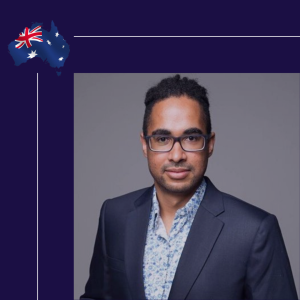
Friday Jan 03, 2020
Friday Jan 03, 2020
Genetic Counselor Matt Burgess join the first episode of 2020 to talk about Australian genetic counseling and being a clinical science liaison. He built one of Australia’s most successful genetic counseling private practices in Melbourne. Matt provided versatile genetic counseling services using a broad scope of knowledge including hereditary cancer, neurogenetics, prenatal genetics, adult, pediatric and cardiac genetics. He earned a graduate degree in genetic counseling from the University of Newcastle and a Masters of Applied Positive Psychology at The University of Melbourne. He is currently a Clinical Science Liaison at Baylor Genetics. Matt also hosts another genetics podcast, “Demystifying Genetics”, which makes this is episode part of my crossover series with other genetic podcasts.On This Episode We Discuss:Australian Genetic CounselingNumber of Genetic Counselors and ProgramsMain Areas of PracticeHealthcare System Compared to the United StatesPrivate v. Public Health FacilitiesInsurance and Hospital StructuresCertification ProcessPrivate PracticesRequirements to See A Genetic CounselorIndustry SpecialityRole of a Clinical Science LiaisonThe Advantage of a Clinical BackgroundHow to Support Sales EducationStay tuned for the next new episode of DNA Today! New episodes are released on the first Friday of the month with some bonus episode thrown in there. In the meantime, you can listen to 113 other episodes on Apple Podcasts, Spotify, or streaming on the website.See what else I am up to on Twitter, Instagram, Facebook and iTunes. Questions/inquiries can be sent to info@DNApodcast.com.
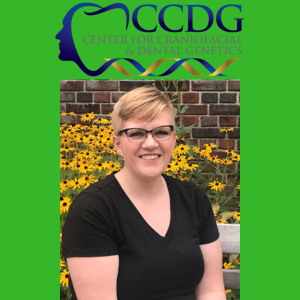
Friday Dec 06, 2019
Friday Dec 06, 2019
This episode is part of the crossover series with other podcasts, today’s episode is a crossover with “Advancing Dentistry” also hosted by Kira Dineen. Lauren Winter joins host Kira Dineen on this episode exploring the genetics of dentistry. They are both genetic counseling graduate students, Lauren attends the University of Pittsburgh and Kira attends Sarah Lawrence College. Lauren is a Research Assistant involved in the COHRA2/COHRA Smile Projects at the Center for Craniofacial and Dental Genetics. Lauren and Kira discuss this project and dental genetics in general.On This Episode We Discuss….Role of Genetics in Oral HealthPotential Uses of Genetic Testing in DentistryFactors Contributing to Oral Health Disparities in AppalachiaData Collecting and Analysis of Human Genetics, Oral Microbiome, Oral pH etc.Participant Requirements and Advantages to a Longitudinal ApproachRelationships Between Genetic Factors, Dental Caries/Cavities and BMIPotential Ways for Dentistry and Genetics to MergeLearn more about Lauren’s experience in her role as a graduate research assistant at the Center for Craniofacial and Dental Genetics in this blog post. Stay updated by following the CCDC on Facebook and Lauren on Twitter.Want to learn more about dentistry? Be sure to check out “Advancing Dentistry” podcast on Apple, Spotify, and AdDent.com. You can also follow on Twitter, Facebook, Instagram and LinkedIn. If you are a dentist or part of a dental team take a look through AdDent’s dental instruments and use code “ADPOD15” for 15% off in the store.Stay tuned for the next new episode of DNA Today released on the first Friday of the month with some bonus episode thrown in there. See what else we are up to on Twitter, Instagram, Facebook and iTunes. Questions/inquiries can be sent to info@DNApodcast.com.
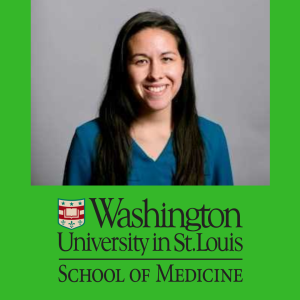
Friday Nov 22, 2019
Friday Nov 22, 2019
On this episode, we explore the pediatric speciality of genetic counseling. Guest Sam Toy is a pediatric genetic counselor at the Washington University School of Medicine in St. Louis. She earned her BS in Biology and MS in Professional Biology from Indiana University. She went on to earn her MS in genetic counseling from Indiana State University.On This Episode We Discuss:The role of a pediatric genetic counselorOutline of a genetic counseling sessionUnique aspects of pediatric genetic counselingGenetic testing whole genome/exome vs specific genesGenetic testing results’ give a diagnosis, change medical management, and insurance coveragePsychosocial aspects of counselingTransitioning from grad school to being a genetic counselor full timeApplication deadlines are approaching for genetic counseling grad schools, if you are working on your applications check out episode 87 which features tips from genetic counseling students on applications. Then episode 97 has advice on the other half of the application process (interviews, ranks, and match) once January/February rolls around.Next week is Thanksgiving in the US, and that means it’s National Family Health History Day, so if you have an opportunity with family this holiday ask them about health history, it’s the best genetic test we have!Variant classification and interpretation have become important skills for genetic counselors. But it takes so long! Even if it’s just a VUS you want to double check. To make it streamlined check out franklin.genoox.com/DNAToday. You can access so much information about a variant including relevant publications, automated ACMG classifications, annotations and phenotypes/disease. Best part? It’s free! All this data about one variant is compiled at your fingertips. No more sifting through PubMed! Join the future of variant interpretation.Stay tuned for the next new episode of DNA Today on December 6th, 2019. New episodes are released on the first Friday of the month with some bonus episode thrown in there. See what else I am up to on Twitter, Instagram, Facebook and iTunes. Questions/inquiries can be sent to info@DNApodcast.com.
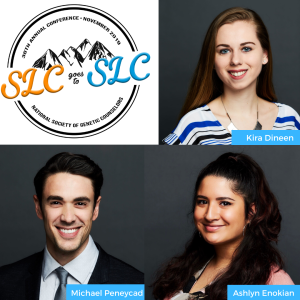
Monday Nov 11, 2019
Monday Nov 11, 2019
The National Society of Genetic Counselors celebrated 40 years at this year’s annual conference! In 2019, we surpassed having 5,000 genetic counselors in the US/Canada! We now have 45 genetic counseling graduate programs in the US and 40 more international.In this podcast episode we recap highlights from the sessions and tips for new attendees next year. Below are some of our talking points and resources we mentioned in the episode. Also check out #NSGC19 on Twitter to read more insight from the conference.Should All Women With Breast Cancer Be Offered Genetic Testing?Panel: Dr Mark Robson from MSK, Dr Peter Beitsch from the Dallas Surgical Group, Sue Friedman founder of FORCE.Moderators: Dr. Lisa Madlensky from UC San Diego and Dr. David Euhus from Johns HopkinsMain points of the talk included…Clinical utilityInformed consent vs informed assentResearch vs diagnosticConcordant vs discordant resultsAccessibility and information givingProvider education and utilization of genetic counseling skillsetNCCN GuidelinesEmerging Therapies for Adult-Onset Neurologic Diseases: Possibilities, Pitfalls And Patient ImpactDr. Sonia VallabhPrion Alliance’s WebsiteWIRED’s article, “One Couple’s Tireless Crusade to Stop a Genetic Killer”The Guardian’s article, “The Lawyer Who Became A Scientist To Find A Cure For Her Fatal Disease.”Enabling The Beautiful Uncertainty of Life: My Journey With PGT-MLee Cooper, JDLee’s article in STAT News, “Genetic Testing Plus IVF Can Sidestep Genetic Disease And Reduce The Need For High-Priced Therapies.”The Institute For Genetic Disease PreventionIn Utero Stem Cell Transplantation: Historical Context, Present State And The Future Of Fetal Molecular TherapiesBillie Rachael Lianoglou, MS, UCSF Center for Maternal-Fetal Precision MedicineTIME Magazine Feature, “Scientists Are Developing New Ways to Treat Disease With Cells, Not Drugs.”Clinical Trial for Alpha Thalassemia MajorUCSF Center for Maternal-Fetal Precision Medicine’s WebsiteHot Topics In Teratology: Zika, Marijuana, and Maternal Therapies For Genetic DiseaseVictoria Wagner, MS, CGC, Myla Ashfaq, CGC, Jennifer Lemons, CGC all from McGovern Medical School at the University of Texas HealthCDC’s Zika General Resources and Pregnancy ResourcesMother To Baby (DNA Today Interview with MTB)Marijuana in Pregnancy Fact SheetConference TipsExhibit hall for networking, free genetics apparel, job board, professional and fun photos.Wear layers because lecture halls are freezing.Lunch sessions are free and sponsored by labs.Prioritize select sessions, there is too much to do everything.Attend a Special Interest Group (SIG), you don’t have to be a member.Follow and join conversations on Twitter (#NSGC19 and #gcchat)Students, job hunt utilizing the job board (in the middle of the exhibit hall) and hand out your resume. If there is a meet up with a specific company/hospital you are interested in working with/at, then go check it out!The PanelMichael Peneycad is a second year graduate student at the Joan H. Marks Program in Human Genetics at Sarah Lawrence College, originally from Grand Rapids, Michigan. He earned his B.S. in Cell & Molecular Biology from the University of Michigan and spent time as adjunct faculty at Grand Valley State University before relocating to New York City in 2014. Michael has been involved in many industries including entertainment, events, automotive, and health care in his time before entering graduate school, working with companies such as Spectrum Health Medical Group, Mazda, Jaguar/Land Rover, Chanel, Google, and Target. Michael has also spent years performing in musicals, commercials, and voice-overs during the time between his academic studies. His professional interests include cancer genetics, patient and provider education, and public health initiatives. You can follow Michael on Twitter and Instagram. Go Blue!Ashlyn Enokian is a second year genetic counseling student from Brighton, Michigan. She earned her BS in Biology and a minor in Criminal Justice from Grand Valley State University in 2017. Her journey into the field of genetic counseling began with advocacy work through Crisis Text Line and Help Pregnancy Crisis Aid. She worked as a genetic counseling assistant in cancer genetics at Saint Joseph Mercy Hospital, pediatric genetics at the University of Michigan, and laboratory genetics at Progenity, Inc. Ashlyn was previously a genetic graphic design intern at My Gene Counsel. Her professional interests include fertility, neurogenetics, and strategies to increase diversity in the field. She acts as a student representative of Sarah Lawrence College’s Class of 2020. You can follow Ashlyn on Twitter..Kira Dineen hosts DNA Today: A Genetics Podcast (and radio show), which was founded in 2012 and features over 100 episodes interviewing genetic counselors, patient advocates and other genetic experts. The show was nominated in the 2015, 2016 and 2019 Podcast Awards. She also hosts other healthcare podcasts including Working For Health, Advancing Dentistry, and Insight Says: A Mental Health Podcast. Kira is a member of National Society of Genetic Counselors’ Digital Ambassador Program (aka #NSGCGenePool). She received her in Bachelor's of Science degree in Diagnostic Genetics with a Cytogenetics concentration at the University of Connecticut, and has a certification as a Cytogenetic Technologist. Along with Ashlyn, she is a student representation in Sarah Lawrence College’s Genetic Counseling Class of 2020.Want to learn more about Sarah Lawrence College’s Genetic Counseling Program? Come to our open house this Friday (November 15th) from 6-8pmET.Stay tuned for the next new episode of DNA Today. New episodes are released on the first Friday of the month with some bonus episode thrown in there. See what else I am up to on Twitter, Instagram, Facebook and iTunes. Questions/inquiries can be sent to info@DNApodcast.com.
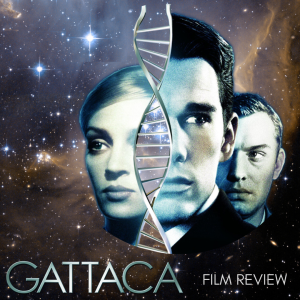
Thursday Oct 24, 2019
Thursday Oct 24, 2019
It’s been 22 years since THE genetic thriller was released…. Gattaca. How has the film aged with genetic technology, society, ethics, and more? Find out in this episode!If it’s been a while since you’ve seen the film, refresh yourself with the plot summary below.Vincent Freeman (Ethan Hawke) has always fantasized about traveling into outer space, but is grounded by his status as a genetically inferior "in-valid." He decides to fight his fate by purchasing the genes of Jerome Morrow (Jude Law), a laboratory-engineered "valid." He assumes Jerome's DNA identity and joins the Gattaca space program, where he falls in love with Irene (Uma Thurman). An investigation into the death of a Gattaca officer (Gore Vidal) complicates Vincent's plans.On This Episode We Discuss Ethical Questions Like...How has our understanding and appreciation of the film changed throughout our careers?Do you think the way Vincent exfoliates and environment would stand up to our current technology?How accurate did the film predict fertility technologies like PDG?What is the true goal of genetic perfection? What is the cost?What types of polygenic risk scores are being offered today?How well can laws really prevent genetic discrimination?How much can you protect your own genetic information?How accurate is the film in regard to the society effects of the “haves” and “have nots”?What was the alternative ending of Gattaca? What does it warn society?Do you have more thoughts about Gattaca? We want to hear from you, tweet @DNApodcast to share your insight! Too long for a tweet? Email in at info@DNApodcast.com.Stay tuned for the next new episode of DNA Today in early November where I will be b joined by a few guests to discuss the National Society of Genetic Counselors Annual Conference. New episodes are typically released on the first Friday of the month. Often I’ll have a second episode later in the month. See what else I am up to on Twitter, Instagram, Facebook and LinkedIn. Questions/inquiries can be sent to info@DNApodcast.com.
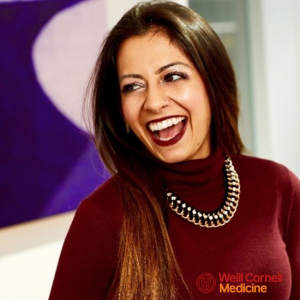
Friday Oct 04, 2019
Friday Oct 04, 2019
Shenela Lakhani is the Director of Genetic Counseling and Clinical Engagement for the Center of Neurogenetics at Weill Cornell Medical College, in New York City. In this role she studies the genetics of neurodevelopmental disorders and neurological disease of aging and adulthood.Before this role, she was the first certified genetic counselor in Qatar, a country in the Middle East. Shenela established the profession in the country and promoted genetics within the Middle East by speaking at international conferences. In Qatar she helped to establish high-risk breast cancer screening guidelines and a high-risk gastrointestinal clinic while contributing to local testing and screening guidelines.On this episode we explore what it was like to be the first certified genetic counselor in a country and how she was able to start the profession there and make an impact in public health in Qatar.On This Episode We Discuss:Inspiration and Motivation to Move Across the WorldChallenges of Starting Genetic Counseling in A New CountryCommon Genetic Disorders in QatarGenetic Stigma and Public Perspective of HealthcareGenetic Carrier and Newborn Testing in QatarAdaptations to Counseling in A Different CountryLearn more about Shenela Lakhani on her LinkedIn Profile and Weill Cornell’s Center for Neurogenetics website.Stay tuned for the next new episode of DNA Today on October 24th, 2019. In this special installment my peers Ale Cantu and Catherine Mayo join me to celebrate the 22nd anniversary of the genetics film Gattaca by discussing its relevance today in the field.New episodes are released on the first and third Fridays of the month. See what else we are up to on Twitter, Instagram, Facebook and iTunes. Questions/inquiries can be sent to info@DNApodcast.com.
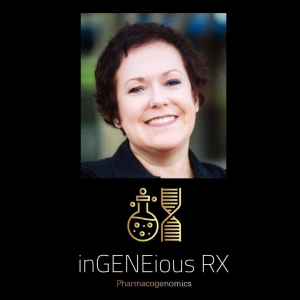
Friday Sep 20, 2019
Friday Sep 20, 2019
On this episode Dr. Becky Winslow, a Doctor of Clinical Pharmacy, shares her insight about pharmacogenomics. She is a Clinical Pharmacogenetics Implementation Consortium Member, a Registered Pharmacogenomics Education Provider and a pharmacogenomics implementation specialist as the owner of inGENEious RX, LLC.On This Episode We Discuss:Pharmacogenomics vs PharmacogeneticsCurrent Understanding of PharmacogenomicsTesting AvailableGeneral Population TestingAreas of Healthcare UltizedPrecision Medicine Approach to PrescriptionsMental Health, Cancer etc.Roadblock to Widespread UsePhysicians Ability to Translate Test ResultsGenetic Counselors Potential RoleFuture of PharmacogenomicsCheck out the first truly anonymous direct to consumer genetic testing company, Secret Sequence. The founders joined me on episode 105 to share about the company and what they offer consumers. For $25 off two or more DNA kits use promo code, “DNAToday” at secretsequence.com. See what else they are up to on Instagram, Facebook, and Twitter. Have questions for them? Give them a ring at 833-Secret3.Stay tuned for the next new episode of DNA Today. New episodes are released on the first Friday of the month with some bonus episode thrown in there. See what else I am up to on Twitter, Instagram, Facebook and iTunes. Questions/inquiries can be sent to info@DNApodcast.com.
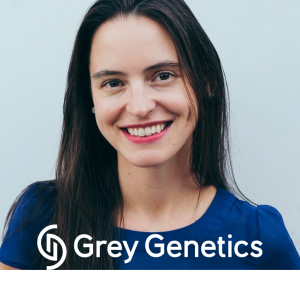
Friday Sep 06, 2019
Friday Sep 06, 2019
The genetic podcast crossover series continues with Grey Genetics’ Patient Stories! Host Eleanor Griffith returns as a guest to offer listeners a peek inside her genetic counseling company behind the podcast.Eleanor Griffith is a board certified genetic counselor and the founder of Grey Genetics, a genetic counseling and consulting company. Her clinical experience includes both prenatal and cancer genetics, in both public and private academic hospital settings. She is a member of the Admissions Committee for The Joan H. Marks Graduate Program in Human Genetics at Sarah Lawrence College and a Course Instructor at Sarah Lawrence where she also received her master’s.Eleanor’s previous appearance was on episode 71 of the show back in 2017. She shared her insight on how to have a competitive genetic counseling graduate school application. There are also 2 other episodes of this show (87 and 97) where myself and a panel of other grad school students discuss the application process including the match system, which was brand new for my class.On This Episode We Discuss:Grey Genetics’ Genetic Counseling ServicesGenetic Counseling Specialities OfferedProcess from the Patient Perspective.Requirements, Insurance, Self-PayGenetic Counselor State Licensure for TelehealthBe sure to check out Grey Genetics’ podcast, Patient Stories. Stay updated on Twitter and Instagram. Meet the Grey Genetics network! Learn more about Grey Genetics in this Medium piece.Stay tuned for the next new episode of DNA Today. New episodes are released on the first and third Fridays of the month. See what else I am up to on Twitter, Instagram, Facebook and iTunes. Questions/inquiries can be sent to info@DNApodcast.com.
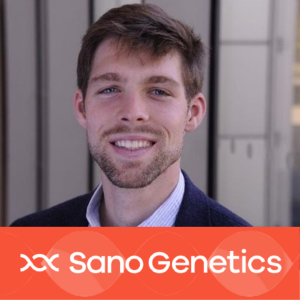
Friday Aug 23, 2019
Friday Aug 23, 2019
This episode launches a new series within the show: crossover episodes! I’m teaming up with other genetics podcast to invite hosts of other shows to join me on DNA Today and sometimes I’ll be a guest on their show as well.Kicking off this new series is Dr. Patrick Short, the CEO of Sano Genetics. He is experienced in genomics research with a focus on large-scale genome sequencing projects and rare disorders. Previously he was at the Wellcome Trust Sanger Institute and the University of Cambridge in England. We explore current understandings of genetics of autism and Sano Genetics’s studies.On This Episode We Discuss:Sano Genetics’ for Patients, Consumers and ResearchersEligible Participants For Sano Genetics' StudiesUnderlying Autism and Mathematical AbilityCurrent Understanding of Autism GeneticsGenetic Testing for AutismUniversity of Cambridge’s Autism Research StudiesLargest Study of Psychological Sex Differences and Autistic TraitsThis episode is one part of our conversation, to hear the other half of our conversation check out their podcast, “The Genetics Podcast”. On that episode, Dr. Patrick Short interviews me about genetic counseling and cytogenetics.Stay tuned for the next new episode of DNA Today next week on Friday September 6th. New episodes are released on the first Friday of the month with some bonus episode thrown in there, like this one!See what else I am up to on Twitter, Instagram, Facebook and iTunes. Questions/inquiries can be sent to info@DNApodcast.com.This summer I was interviewed on a few podcasts including In EyeSight talking about impact social media’s impact on the rare diseases community and on Dr. Mara Karpel’s Your Golden Years sharing about genetic counseling and testing.
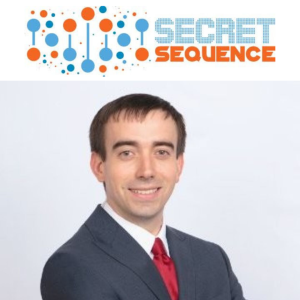
Friday Aug 02, 2019
Friday Aug 02, 2019
This episode launches Secret Sequence as the new sponsor for the show! Joining me on the episode are the founding team of Secret Sequence, Jason Corbiere and Austin Maier.On This Episode We Discuss Genetic Privacy:- Secret Sequence’s Genetic Testing Kits- Data Security of Genetic Tests- Major Data Breaches- GEDmatch’s Role in Identifying the Golden State Killer- Genetic Information Nondiscrimination Act of 2008 (GINA)- Data Privacy Responsibility of Genetic Testing Companies (DTC and medical grade)- Continued Explosion of Direct To Consumer Genetic Testing (100 million consumers by 2021)- Kira’s Experience with Secret Sequence Genetic Testing KitsFor $25 off two or more kits use promo code, “DNAToday” at secretsequence.com. See what else they are up to on Instagram, Facebook, and Twitter. Have questions for them? Give them a ring at 833-Secret3.Stay tuned for the next new episode of DNA Today or go back and listen to over 100 other episodes! New episodes are released on the first Friday of the month with some bonus episode thrown in there. See what else I am up to on Twitter, Instagram, Facebook and iTunes. Questions/inquiries can be sent to info@DNApodcast.com.








